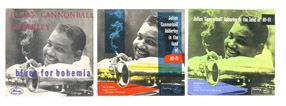|
|
| Discography |
| About Julian |
| About Site |
Since Dec,01,1998
©1998 By barybary

![]()
|
"IN THE LAND OF HI-FI" |
 |
|
Original front cover LP EmArcy MG360077 |
Other Reissue on LP
this Lp has never been reissued in CD format
FEATURING
Cannonball Adderley (as)
Nat Adderley (cornet)
Ernie Royal (tp)
Bobby Byrne, Jimmy Cleveland (tb)
Jerome Richardson (ts &flt)
Danny Bank (bar)
Junior Mance (piano)
Keeter Betts (bass)
Specs Wright (drums)
SIDE A
1. DOG MY CATS 2:26 (Ernie
Wilkins) American Jazz/BMi
2. I'M GLAD THERE IS YOU 2:36 (norsey-Madeifa) Morley
Music Corp./ASCAP
3. BLUES FOR BOHEMIA 3:56 (Julian& Nat Adderley)
Melody Lane/BMi
4. JUNIOR'S TUNE 3:24 (J.Mance)Hartsdale Music/BMI
5. BETWEEN DEVIL &DEEP BLUE SEA 3:23 (Koehler &
Arlen) Mills Music lnc./ASCAP
SIDE B
6. CASA DE MARCEL 2:43 (Marcel)Steinway
Music/BMI
7. LITTLE GIRL BLUE 2:37(Rodgers& Hart) T.B.
Harms/ASCAP
8. T'S TUNE 3:13(Thomas Turrentine) Southern
Music/BMI
9. BROADWAY AT BASIN STREET 3:43(Wavne & Frisch)
Admont Southern Music/ASCAP
10. JUST NORMAN 2:31(Wright)Steinway Music/BMI
11. I DON'T CARE 2:38(Ray Bryant) Bayes Music
Corp./BMI
|
Recorded in N.Y. June 8 ,1956 ( 5-7-9-10) , June 16 ,1956 ( 1-2-4-6 ) June 18 , 1956 (3-8-11) |
|
Julian "Cannonball" Adderley fired his first shot, a salvo heard throughout the entire world of jazz, when his initial album (MG 36043) was released less than a year ago. Soon after, he was featured in a quintet session under the leadership of his brother, Nat , on the Wing label; more recently, "Cannonball" was featured with a string ensemble, arranged and conducted by Richard Hayman, in an impressive set of performances on standard tunes, (MG 36063). These albums, further implemented by guest appearances with Sarah Vaughan and other visitors to the Land of Hi Fi, succeeded in their objective of establishing "Cannonball' as a major new jazz talent. With the present excursion of the Adderley brothers and their cohorts to the Land of Hi Fi, "Cannonball" returns approximately to the same format and setting featured on his first album. Ernie Wilkins served as conductor and arranger. Like Quincy Jones, who was the musical director on the first Adderley session, Ernie recently returned from a tour of the Middle East, during which he played in the all-star band sponsored by the State Department and led by Dizzy Gillespie. On returning home, he put down the saxophone, picked up the pen and went promptly to work on this album, recorded in June, 1956 with the following participants: Nat Adderley, cornet; Ernie Royal, trumpet; "Cannonball" Adderley, alto sax; Jerome Richardson, tenor sax and flute; Danny Bank, baritone Sax; Jimmy Cleveland and Bobby Byrne, trombones; Junior Mance, piano; Charlie "Specs" Wright, drums; Keeter Betts, bass. Most of the tunes heard on these sides had never been recorded before. "Dog My Cats" is and Ernie Wilkins original taken at a fast clip, starting with some fine Mance piano work. "I'm Glad There Is You" is a sensitive Wilkins treatment of the standard tune, showing "Cannonball" in his best ballad mood. "Blues from Bohemia", despite its title, is actually built on a thirty-two bar construction, with some excellent work by Nat Adderley, whose tone and style occasionally recall Clark Terry, and by "Cannonball", who named this tune for the Greenwich Village night club where New Yorkers first saw, heard and raved about him in the summer of 1955. "Junior's Theme", dreamed up, of course, by Mr. Mance, is a slightly old-timey theme with a pleasant beat and excellent work by Mance and both Adderleys, "Between the Devil and the Deep Blues Sea" is a Harold Arlen song of 1931, in which Jimmy Cleveland's chorus is startling in its technique and dazzling in style, a match for the brilliant fluency of "Cannonball" himself, some of whose finest alto work is heard here. "Casa De Marcel", a tune written by a young writer named Marcel Daniels from Chicago, is an attractive medium-tempo item. "Little Girl Blue", except for a piano interlude, is "Cannonball" all the way. "T's Tune", a brain child of one Thomas Turrentine, a trumpet player from Pittsburgh who once worked around the Middle West along with Ernie Wilkins in the George Hudson orchestra. It's a slow, funky blues with more wonderful work by Mance and "Cannonball". "Broadway at Basin Street", starting with an alto cadenza, goes into fast minor-key ad libbing by "Cannonball" before the time is cut in half for some unison ensemble work. This tune supposedly is the Basin Street club's answer to "Lullaby of Birdland", New York's Basin Street, we need hardly add, is not a street at all, but a bistro located on 51st Street just off Broadway. "Cannonball's" group has played there several times in recent months. "Just Norman", a boppish original, has fine work by Nat and Julian, as well as some solo flashed by Specs, who composed it. The meaning of the title is wrapped in mystery; Specs was out of town as these notes went to press, so we were unable to confirm the rumor that it was dedicated to Norman Vincent Peale. The set closes with "I Don't Care", a minor-key original by Ray Bryant, a young Philadelphia pianist In addition to "Cannonball's" remarkable work here, there is some fine flute by Jerome Richardson, in both solo and ensemble capacity. Jerome Richardson, in both solo and ensemble capacity. Jerome is one of the few men who can make a growl convincingly; those who remember the late, great Esy Morales will know what we mean.
To sum up, this is a lively, swinging session of unpretentious modern jazz that will serve further to consolidate "Cannonball's' reputation as one of the big guns in contemporary music.
|



